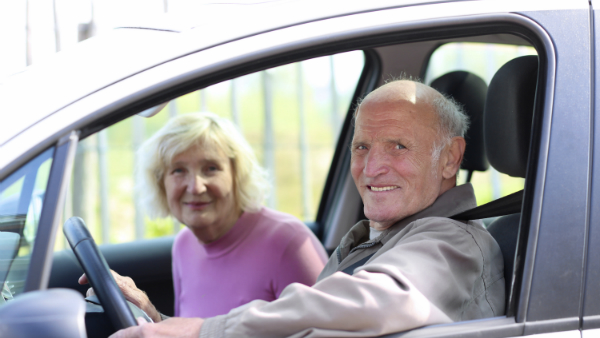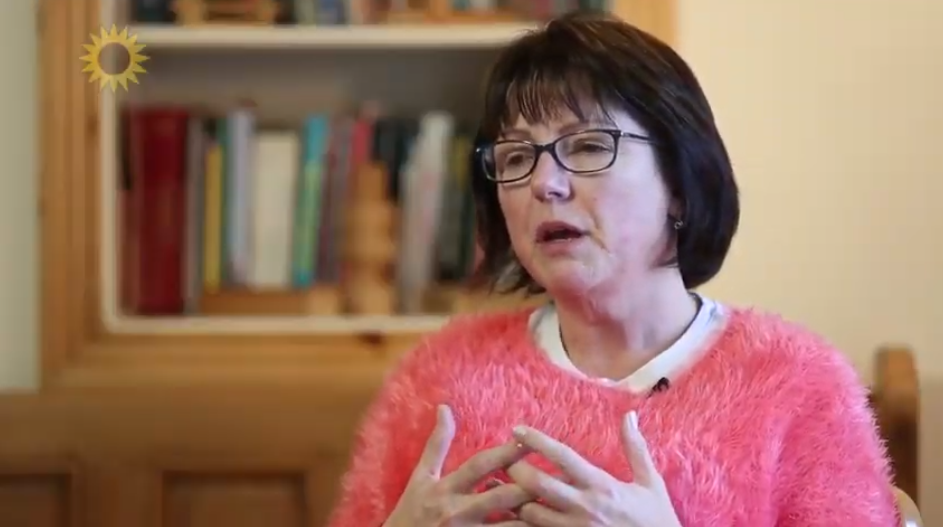Day to Day Living
If you are caring for someone with dementia, you will want to ensure that they remain as fit and healthy as possible. The better the person feels the more enjoyment they are likely to get from life and the easier it will be for both of you to manage.
Communicating

Communicating our needs, wishes and thoughts is vital. Dementia affects how we communicate, even in the early stages.
We all need to communicate; it is part of our identity and vital for our quality of life. We tend to think about communication as talking, yet over 90% of communication happens through non-verbal communication such as facial expression, gestures and touch.
Take your time. Be patient and understanding and keep your sense of humour, it helps!
Anonymous
Dementia affects how we communicate; each person’s experience is different. Below are tips and techniques to help.
- Reduce background noise and distractions such as TV or radio or other people’s conversations
- Try to make eye contact
- Speak slowly, clearly and calmly
- Listen carefully and allow plenty of time for the person to respond to you
- Make sure your body language and expression match what you are saying
For a full list of tips for communicating with a person with dementia download the resource Communication by clicking here
For more information
- Talk to your GP or health care professional
- Call the National Helpline on 1800 341 341
- Consider joining a family carer support group. Click here to see what services and support are available in your area.
Driving and dementia

A diagnosis of dementia does not mean a person must stop driving straightaway. However, a diagnosis does mean that certain things must be done to continue to drive. A person with dementia must inform the National Driver Licence Service (NDLS) about their diagnosis. The driver must also inform their car insurance company to ensure their insurance is still valid.
Most drivers with dementia accept that over time dementia affects their ability to drive safely. With guidance and support from family and healthcare professionals, they will engage with regular assessments and limit their driving when required. Most people will also engage in planning to stop driving and decide themselves they no longer want to drive.
For information on where to find your local on road driving assessment centre click here
Once a diagnosis is confirmed, it is necessary to take certain steps. Talk to your doctor about these steps and they can guide you on each one.
- Inform the insurance company of the person who has been diagnosed. If you do not do this, their insurance may not be valid.
- Notify the National Driving Licence Service.
- They may need to complete an ‘on-road’ assessment. Your doctor or your insurance company may ask you to do this.
Supporting a person with dementia to stop driving
The decision to stop driving can have a big impact on both the person with dementia and their family. It does indicate that their dementia has progressed and for many people the loss of independence is very difficult to cope with.
Some people with dementia feel relieved to stop driving and are comfortable finding new ways to get out and about. However, even people who willingly give up driving may feel sad and low in mood in the weeks and months that follow the decision. They may be irritable and defensive. It is important that their doctor is aware of any changes in mood and behaviour following the decision.
Family members and friends can help and support, things you can do include:
- Allow the person to talk about it if they want to, acknowledge it is difficult.
- Be positive, focus on the benefits that come with not having a car for example:
- no need to navigate traffic and find parking,
- no longer paying for car insurance, tax or fuel,
- no more organising or paying for car service and repairs.
- Encourage the person to see that it is still possible to get out and about and do things. Take the time to help them figure out new ways to travel. A mix of public and private transport services, family and friends can often provide realistic options. For example,
- some people set up an account with a local taxi company who get to know the person and their family and often offer an agreed rate for frequent use,
- Local bus services can be very useful and provide an opportunity to meet people,
- Sometimes friends and neighbours go to the same club or have the same hobby and are open to giving a lift.
- Highlight the Free Travel Scheme, which entitles anyone 66 years or older to free travel on public transport (bus, rail, DART and Luas) with some exceptions. Some private bus operators also accept free travel cards. The Department of Social Protection website provides a list of these companies.
- TFI Local Link bus services connect communities throughout rural Ireland as part of the TFI Public Transport Network. They form a network of affordable bus services for everyone who wants to travel to travel to or from local towns and villages. There are two different types of Local Link service: Regular Rural Bus Services and Door-to-Door Bus Services. Click HERE for local timetables for the rural bus service and the door-to-door service.
- There are various business cards people can get free of charge to let the drivers and other passengers know that they may need assistance. Details of these are available HERE
For more information:
- Call the National Helpline on 1800 341 341
- Visit your GP
- Download and read our factsheet
- Contact the Road Safety Authority by clicking here
- For information about the on-road assessments read the NDLS booklet
- Visit the NDLS website
Assistive Technology

Assistive technology can be a product, gadget or system that help support and enable you to live more independently, provide support and reassurance and reduce the risk of accidents.
Different technologies will suit different people and assistive technology will not suit everyone. You may need to try different options to find the solution that suits you.
Assistive technology can help your loved one be more independent and to help you manage daily life. These include the following:
- staying safe out and about by using routines, adapting activities and using assistive technologies such as location or safer walking devices
- get automatic help with telecare which can be as basic as having a smoke detector
- keep everyday activities safe with the help of technology such as bath alarms or motion-sensor night lights
While assistive technology will not work on it’s own, it can be part of the plan you make to help you and your family to live well with dementia.
For more information read our ‘Practical steps to support your independence‘ booklet which is a for people with dementia and their families. People with mild cognitive impairment and people who are experiencing memory problems may also find this booklet helpful.
In this booklet we explain what assistive technology is; give examples of how assistive technology can help you with daily life; and tell you where you can go and who you can speak to about accessing assistive technology. Click here to download a copy.
Where to find assistive technology?
The following websites have lists of products and details about who you can order from

Dementia Circle: Funded by The Alzheimer Society in Scotland, this website has reviews from people with dementia and their families who have tested products; they also have helpful information sheets.

Memory Libraries in Ireland
There are a number of memory libraries and memory resource rooms which have assistive technology products on display.
You can arrange a visit by contacting the library you wish to visit. The libraries are run by the Health Service Executive, HSE. Most have an occupational therapist who can meet with you to discuss your needs.
For a list of all Memory libraries in Ireland click here
Maintaining skills

It is important for the person with dementia to stay independent for as long as possible. You should encourage the person and only offer help when it is necessary.
As dementia progresses the person may find certain tasks increasingly difficult, while they may be able to cope with others for some time. Adjust any help you offer accordingly so that they can continue to make the best use of the skills they still possess. Ways of helping that may be appropriate at different times include:
- Being able to complete a task when it is broken down into step by step process. For example lay clothes out the order that the person is getting dressed.
- Pointing, demonstrating or guiding an action may sometimes be more helpful than verbal explanations at later stages. For example, the person may be able to brush their own hair if you start by gently guiding their hand.
- Encouragement to help out with simple tasks around the house and garden will enable the person with dementia to practise everyday skills and feel useful at the same time.
- Memory aids can assist in doing daily tasks and skills such as noticeboards, labels etc.
- Attending social clubs or day care centres can help to stay social.
For more information:
- Visit your GP
- Contact Occupational therapist on aids/supports for the house
- Read and download:
- See what services and support are available to you in your local area such as social clubs, day care centre etc.
Safety in the home
There are many ways you can make your home safe for a person with dementia. You will just need to be alert for changes in capabilities over time as the dementia progresses.
An occupational therapist can assist you in getting aids and equipment to help with daily living such as handrails, a bath step or a walking stick.
Adjustments you can make in the home include:
- Make sure lighting is bright
- Leave a light on in the hallway if the person with dementia is likely to wander at night
- Ensure there are no loose carpets or mats which could cause a person to fall
- Place medicines in a safe location
- Lock away any poisonous substances such as cleaning products, disinfectant or paint stripper for example.
For further information:
- Visit your GP or health care professional
- Contact Occupational therapist on aids/supports for the house
- Read and download our resource
- Call the National Alzheimer Society Helpline on 1800 341 341
Caring at Christmas

Christmas can be a wonderful time for family and friends. At the best of times it can also be overwhelming.
When caring for a loved one with dementia, it can easily feel all too much. When making plans ahead of Christmas this year you should assess current COVID-19 levels to determine what you can do in line with current public health advice from the Government.
Some tips you can use this festive season include:
- Have realistic expectations, things may need to be different but still enjoyable for everyone;
- Talk to the person with dementia about what they think about Christmas and how they would like to be involved. Consider their past attitude to Christmas;
- Talk to family and friends in advance about what you both feel is needed to make the day work for everyone;
- On Christmas day involve the person with dementia in the preparations, for example setting the table, preparing vegetables or a festive activity such as singing carols.
- If it is not possible to have the normal amount of visitors, or visit others in the usual way you would before Covid 19 try to stay connected with family and friends in any way you can – by phone or video-call. Ask family or friends to give you any necessary guidance and support around how to use technologies that may help your loved one to still feel connected
For further information:
- Read and download our factsheet
- Call the National Helpline on 1800 341 341
Travel and Dementia
For every person living with dementia, the journey is different. For those who are able to go on holiday, it can offer enormous benefits for the person with dementia and their loved ones. Planning is essential when it comes to going away
Click HERE for information on services available to make a shopping trip or journey easier for the person with dementia and for the carer.
Click HERE for the top 10 travel tips for people with dementia and their families
Tips for flying with a person with dementia.
Many people with dementia enjoy travelling, but as the disease progresses, both they and their caregivers may find it becomes increasingly difficult. These tips could help make your next air travel experience as stress-free as possible.
Click HERE for tips for flying with a person with dementia.


